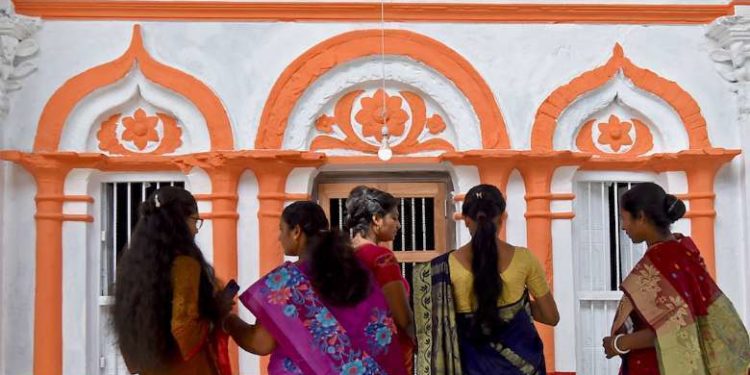The 90-year-old Khieu Samphan is expected to deliver his final defense in his appeal against convictions for genocide and crimes against humanity next week. A bench of Cambodian and international judges will then deliberate on his appeal at the Extraordinary Chambers in the Courts of Cambodia and then finalize its legal work which began more than 15 years ago.
Former Khmer Rouge head of state Khieu Samphan stands during his verdict in court at the ECCC in Phnom Penh on Nov. 16, 2018. (Photo: ECCC via AFP)
The court earlier convicted the former commandant of the S21 torture and extermination center, Kaing Guek Eav, commonly known as Duch, and former “brother number two” Nuon Chea. Both died in jail.
Other accused including Pol Pot’s former foreign minister Ieng Sary, his wife Ieng Thirith and former military chief Ta Mok also died behind bars before the verdicts were reached. Dictator Pol Pot died under house arrest in 1998 shortly after the tribunal was set up.
Thailand’s authoritarian regime of former army chief Prayut Chan-o-cha has emerged as one of the worst violators of free speech in cyberspace.
Comparitech ranked Thailand among countries where internet freedom is extremely restricted. The ranking shows the internet in Thailand is 73 percent restricted. The ranking is a disgraceful fall for a country once seen as relatively free in Southeast Asia.

Thai commuters check their phones as they wait for an underground train in Bangkok. The internet is facing increasing censorship in the Southeast Asian nation. (Photo: AFP)
Thailand has faced strong criticism from rights groups and United Nations bodies for heavy crackdowns on political opposition and pro-democracy protesters. Dozens of politicians and pro-democracy activists have been charged under a repressive royal defamation law for calling for reform of the monarchy and political system and even for criticizing the regime’s disastrous response to the Covid-19 pandemic.
In the latest case, nine pro-democracy activists were arrested last Sunday for joining a protest demanding the release of 32 other activists.
The Catholic Church in Myanmar has stepped up efforts to assist the poor amid the Covid-19 pandemic as the nation reels from the fallout of political unrest, economic crisis and poverty.
The Catholic Bishops’ Conference of Myanmar has urged all 16 dioceses to open care centers, spread awareness about the pandemic and to reach out to needy people with food and other essential supplies. Churches across the country have already converted seminaries, parish halls, pastoral centers and boarding hostels into Covid care centers to accommodate people of all ethnicities and religions.

A woman and her daughter collect a pack of eggs in Yangon amid the Covid-19 crisis in Myanmar. (Photo: AFP)
Catholic bishops have also launched a two-week national prayer campaign, inviting people of all religions in Myanmar to pray together to overcome the pandemic. The military-ruled country has been struggling amid a deadly third wave in recent weeks.
Officially, it has recorded over 341,000 infections and more than 12,400 deaths. However, health experts believe the actual number of fatalities is much higher.
As millions of tribal people in India marked the International Day for World’s Indigenous Peoples on Monday, tribal leaders and activists vowed to continue their fight for equal rights and dignity in society.
Activists recalled the great contributions of the late Jesuit priest Father Stan Swamy, who fought for the lawful rights of tribal people in eastern India for decades.

Tribal women perform a traditional dance during the celebration of the International Day of the World’s Indigenous Peoples in Tripura on Aug. 9. (Photo supplied)
Tribal people constitute 8.6 percent of India’s 1.3 billion population and have sizable numbers in states like Jharkhand, Arunachal Pradesh, West Bengal, Sikkim, Meghalaya, Tripura, Madhya Pradesh, Manipur and Mizoram. India supported the UN Declaration on the Rights of Indigenous Peoples in 2007 on condition that all Indians were considered indigenous. The move robbed tribal people of special status.
Despite special provisions for education and employment, most tribal people in India face marginalization, discrimination and exclusion.
Credit: Source link




